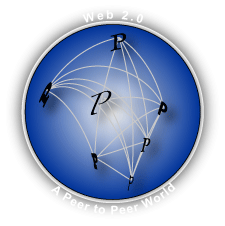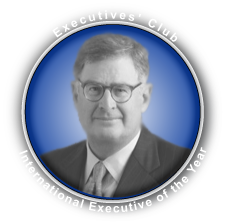2009 Poised as Inflection Point in Enterprise Usage—LinkedIn Increases Relevance to B2B Executives
 During the 1990s, I was intimately involved with helping global organizations to decentralize their information technology—as a management consultant and marketing executive. However, a far more disruptive force is imminent today: communications and marketing are rapidly evolving into a networked, distributed pattern, following IT’s lead. Individuals that congregate online will have an increasing role in affecting how other people make decisions, significantly weakening the influence of the mass media on which many marketing strategies depend. Organizations that depend on centralized, controlled communications will be astonished at how fast they become irrelevant over the next five years. Although the case studies are still being written, I’ll go on record as saying that the 2008 U.S. presidential election will prove to be an inflection point of digital social networks’ disruptive potential. During the 1990s, I was intimately involved with helping global organizations to decentralize their information technology—as a management consultant and marketing executive. However, a far more disruptive force is imminent today: communications and marketing are rapidly evolving into a networked, distributed pattern, following IT’s lead. Individuals that congregate online will have an increasing role in affecting how other people make decisions, significantly weakening the influence of the mass media on which many marketing strategies depend. Organizations that depend on centralized, controlled communications will be astonished at how fast they become irrelevant over the next five years. Although the case studies are still being written, I’ll go on record as saying that the 2008 U.S. presidential election will prove to be an inflection point of digital social networks’ disruptive potential.
LinkedIn is a leading venue for B2B and B2C executives, so it merits significant attention. The inputs for this Executive Adoption Snapshot are varied: I have had the opportunity to work with hundreds of executives to apply LinkedIn to their business processes in 2008. I met two LinkedIn executives […]
How Social Networks Boost Market Efficiency for B2B Buyers and Sellers explains how to use LinkedIn to change the rules of business development
 Since the early 2000s, everyone has struggled to develop measurable economic models for social media and Web 2.0, mostly with little success. During 2007 and 2008, CSRA has worked with clients on several levels hammering out models to pass enterprise muster, and here I will briefly share one that shows considerable promise for its practicality and utility to businesses. The immediate context is B2B business development and sales, but it is applicable to numerous other enterprise processes as well. Since the early 2000s, everyone has struggled to develop measurable economic models for social media and Web 2.0, mostly with little success. During 2007 and 2008, CSRA has worked with clients on several levels hammering out models to pass enterprise muster, and here I will briefly share one that shows considerable promise for its practicality and utility to businesses. The immediate context is B2B business development and sales, but it is applicable to numerous other enterprise processes as well.
[…]
How you can use LinkedIn to maximize the number of clients in your portfolio that map to your firm’s unique selling proposition—boosting profitability […]
Enterprise 2.0 and B2C Web 2.0 Show Serious Traction—But Social Sticky Wickets Remain—How to Trust?
 The Social Networking Conference (SNC) was an excellent place to check the pulse of Web 2.0 adoption from customer and provider perspectives. Producer Marc Lesnick explained in his opening remarks that, in the months preceding this conference, corporations had knocked on his door asking to get involved. His Ticonderoga Ventures had held several SNCs over the past few years, and it had been largely the purview of social networking start-ups and their facilitators. This is a very apt indication of the enterprise adoption predicted by my State of Social Networking Forrester coverage and 2007 Review. The Social Networking Conference (SNC) was an excellent place to check the pulse of Web 2.0 adoption from customer and provider perspectives. Producer Marc Lesnick explained in his opening remarks that, in the months preceding this conference, corporations had knocked on his door asking to get involved. His Ticonderoga Ventures had held several SNCs over the past few years, and it had been largely the purview of social networking start-ups and their facilitators. This is a very apt indication of the enterprise adoption predicted by my State of Social Networking Forrester coverage and 2007 Review.
SNC SF 2008 took place July 10-11, 2008 at the UC San Francisco’s Mission Bay Conference Center. It was a focused conference that balanced start-ups’ and enterprises’ innovation—with a dash of perspective from Apple co-founder Steve Wozniak and Social Networking Watch’s Mark Brooks. On the enterprise side, GE’s Grewal and GM’s Denison covered the enterprise 2.0 and B2C Web 2.0 perspectives respectively, while the U.S. Air Force’s Adkins presented nascent cross-boundary collaboration in […]
Leveraging B2C “Social” Networks for Real Enterprise Advantage—Flashbacks to Web 1.0—People in Bars
 Pan in, circa 1998, and enterprises were beginning to doubt the conventional wisdom that had prevailed during the past three years, namely that “the Internet” was a Silicon Valley fad that would blow over with nary a whimper. It was “for kids,” it didn’t merit adult attention—none of these “businesses” were making money anyway. You can’t be serious, how could a money-losing online bookstore affect GM? It looks silly to read these words today, but that’s only because we know what happened. Here I will suggest that we are on the cusp of a similar shift with Web 2.0 and social networks, I’ll outline an approach you can use to consider your adoption strategy, and I will recommend tactical things you can do right now to leverage LinkedIn, Facebook, Twitter, YouTube, Del.icio.us and others. Pan in, circa 1998, and enterprises were beginning to doubt the conventional wisdom that had prevailed during the past three years, namely that “the Internet” was a Silicon Valley fad that would blow over with nary a whimper. It was “for kids,” it didn’t merit adult attention—none of these “businesses” were making money anyway. You can’t be serious, how could a money-losing online bookstore affect GM? It looks silly to read these words today, but that’s only because we know what happened. Here I will suggest that we are on the cusp of a similar shift with Web 2.0 and social networks, I’ll outline an approach you can use to consider your adoption strategy, and I will recommend tactical things you can do right now to leverage LinkedIn, Facebook, Twitter, YouTube, Del.icio.us and others.
Since 2006, my consulting work has encompassed strategic and tactical sides of Web 2.0 and social networks and, in 2008, I launched a tactically-focused service, the Executive’s Guide to LinkedIn, which helps global enterprises to use LinkedIn for process innovation. This has provided the […]
Leadership, Trust and the Globally Integrated Enterprise reports on IBM’s CEO as he articulated a prescient vision for the enterprise—adapting to the Knowledge Economy.
 Samuel J. Palmisano, Chairman, President and Chief Executive Officer of IBM Corporation, outlined a new version of the enterprise at a lunch honoring him with the Executives’ Club of Chicago’s Thirteenth Annual International Executive of the Year Award April 12, 2007 at the Chicago Hilton. Entitled “Leadership, Trust and the Globally Integrated Enterprise,” his speech emphasized key points from his Summer 2006 article of the same name in Foreign Affairs. He was especially interesting to hear due to his experience with leading one of the world’s foremost global enterprises as well as his insight from serving global enterprises in every industry. Samuel J. Palmisano, Chairman, President and Chief Executive Officer of IBM Corporation, outlined a new version of the enterprise at a lunch honoring him with the Executives’ Club of Chicago’s Thirteenth Annual International Executive of the Year Award April 12, 2007 at the Chicago Hilton. Entitled “Leadership, Trust and the Globally Integrated Enterprise,” his speech emphasized key points from his Summer 2006 article of the same name in Foreign Affairs. He was especially interesting to hear due to his experience with leading one of the world’s foremost global enterprises as well as his insight from serving global enterprises in every industry.
Yesterday’s model for the global enterprise, the multinational corporation (MNC), looks increasingly outdated due to widespread adoption of standards-based technology, increasingly standardized work processes and a liberalizing regulatory environment. Today, knowledge-based resources are available globally, and the enterprise’s means to create value is choosing how and where to tap the resources to […]
The Internet, E-Business and Web 2.0 in Context
 Web 2.0 and social networks readily appear as hype, but I will argue that they are actors in a much larger drama, the emergence of the Knowledge Economy, which is currently in its third phase, Web 2.0 and social networks. By understanding the transformation of relationships among your customers and between your customers and your company, you will be in a much better position to guide your company through this area of tremendous change. Web 2.0 and social networks readily appear as hype, but I will argue that they are actors in a much larger drama, the emergence of the Knowledge Economy, which is currently in its third phase, Web 2.0 and social networks. By understanding the transformation of relationships among your customers and between your customers and your company, you will be in a much better position to guide your company through this area of tremendous change.
The Ascendance of the Knowledge Economy
The Knowledge Economy is a post-industrial economy in which value is primarily created through information, and differentiation is achieved by explicitly focusing on customer experience itself rather than on products or services. The life cycles of products and services will increasingly shorten. Leaders of companies with products and services who do not understand this face rampant commoditization from which there is no escape except through unprecedented innovation. We are in the third phase of the growth of the Knowledge Economy in which it is transforming relationships. Each phase is ongoing, but the emphasis shifts over […]
How to Increase Your Payback from Using LinkedIn
 LinkedIn is a “social” site that will prove to be of rare benefit to business executives and professionals in building individualized collaborative networks, as I explained in detail in the GHCJ Review of LinkedIn. However, LinkedIn is seriously lacking in providing a step-by-step guide to help the motivated executive to tap its real value. The functionality of the website is easy to use, but many of the finer points of LinkedIn are lost on the majority of users. This guide attempts to address that. LinkedIn is a “social” site that will prove to be of rare benefit to business executives and professionals in building individualized collaborative networks, as I explained in detail in the GHCJ Review of LinkedIn. However, LinkedIn is seriously lacking in providing a step-by-step guide to help the motivated executive to tap its real value. The functionality of the website is easy to use, but many of the finer points of LinkedIn are lost on the majority of users. This guide attempts to address that.
[…]
The Knowledge Economy, Ultimate Context for Understanding the Future welcomes you to the Post-Industrial World, which turns past assumptions on their heads.
 The Knowledge Economy is a post-industrial economy characterized by a highly developed information technology industry along with overproduction and commoditization in industrial and agricultural sectors. Widespread information technology (IT) adoption among producers and consumers enables all market participants to create and share information about all aspects of economic transactions. The creation, packaging and sharing of information is termed “knowledge.” In the Knowledge Economy, information about an underlying good creates most of the good’s differentiated value. The Knowledge Economy is a post-industrial economy characterized by a highly developed information technology industry along with overproduction and commoditization in industrial and agricultural sectors. Widespread information technology (IT) adoption among producers and consumers enables all market participants to create and share information about all aspects of economic transactions. The creation, packaging and sharing of information is termed “knowledge.” In the Knowledge Economy, information about an underlying good creates most of the good’s differentiated value.
Consumer mobilization and engagement in the Knowledge Economy renders many of the Industrial Economy’s rules invalid. In the Industrial Economy, consumers had little information relative to producers, they were isolated from each other, and they had no collective voice. They were at a disadvantage as market participants. The “second stage” of the Internet, “Web 2.0,” facilitates P2P (peer to peer) information sharing, and its tools are free to use and accessible to anyone with an Internet connection. Producers […]
Insight about Human Resources in China featured speakers with decades of experience on the ground in China and offered surprising experiences. The GSB (Booth) International Round Table hosted two Asia and cross-cultural experts 16 February 2006 at Gleacher Center, “Human Resource Challenges for Multinational Corporations in China.” As is my custom, I will summarize the salient facts of the session first, which will be followed by my analysis.
This discussion was led by Deborah Lauer, former VP Global Talent Supply at Motorola who spent six years in China, and Jeffrey Reed, a 20 year veteran of Asia who headed up Unilever-Best Foods joint ventures in Pakistan and China. The talk focused on MNCs’ (multinational corporations) human resource challenges in China, both from expatriate and local talent perspectives. Many of the ideas presented corresponded to the ITA Round Table led by Dr. Wolfgang Fürniß (see China: The New Economy).
[…]
|
|
 During the 1990s, I was intimately involved with helping global organizations to decentralize their information technology—as a management consultant and marketing executive. However, a far more disruptive force is imminent today: communications and marketing are rapidly evolving into a networked, distributed pattern, following IT’s lead. Individuals that congregate online will have an increasing role in affecting how other people make decisions, significantly weakening the influence of the mass media on which many marketing strategies depend. Organizations that depend on centralized, controlled communications will be astonished at how fast they become irrelevant over the next five years. Although the case studies are still being written, I’ll go on record as saying that the 2008 U.S. presidential election will prove to be an inflection point of digital social networks’ disruptive potential.
During the 1990s, I was intimately involved with helping global organizations to decentralize their information technology—as a management consultant and marketing executive. However, a far more disruptive force is imminent today: communications and marketing are rapidly evolving into a networked, distributed pattern, following IT’s lead. Individuals that congregate online will have an increasing role in affecting how other people make decisions, significantly weakening the influence of the mass media on which many marketing strategies depend. Organizations that depend on centralized, controlled communications will be astonished at how fast they become irrelevant over the next five years. Although the case studies are still being written, I’ll go on record as saying that the 2008 U.S. presidential election will prove to be an inflection point of digital social networks’ disruptive potential.
 Since the early 2000s, everyone has struggled to develop measurable economic models for social media and Web 2.0, mostly with little success. During 2007 and 2008, CSRA has worked with clients on several levels hammering out models to pass enterprise muster, and here I will briefly share one that shows considerable promise for its practicality and utility to businesses. The immediate context is B2B business development and sales, but it is applicable to numerous other enterprise processes as well.
Since the early 2000s, everyone has struggled to develop measurable economic models for social media and Web 2.0, mostly with little success. During 2007 and 2008, CSRA has worked with clients on several levels hammering out models to pass enterprise muster, and here I will briefly share one that shows considerable promise for its practicality and utility to businesses. The immediate context is B2B business development and sales, but it is applicable to numerous other enterprise processes as well. The Social Networking Conference (SNC) was an excellent place to check the pulse of Web 2.0 adoption from customer and provider perspectives. Producer Marc Lesnick explained in his opening remarks that, in the months preceding this conference, corporations had knocked on his door asking to get involved. His Ticonderoga Ventures had held several SNCs over the past few years, and it had been largely the purview of social networking start-ups and their facilitators. This is a very apt indication of the enterprise adoption predicted by my State of Social Networking Forrester coverage and 2007 Review.
The Social Networking Conference (SNC) was an excellent place to check the pulse of Web 2.0 adoption from customer and provider perspectives. Producer Marc Lesnick explained in his opening remarks that, in the months preceding this conference, corporations had knocked on his door asking to get involved. His Ticonderoga Ventures had held several SNCs over the past few years, and it had been largely the purview of social networking start-ups and their facilitators. This is a very apt indication of the enterprise adoption predicted by my State of Social Networking Forrester coverage and 2007 Review. Pan in, circa 1998, and enterprises were beginning to doubt the conventional wisdom that had prevailed during the past three years, namely that “the Internet” was a Silicon Valley fad that would blow over with nary a whimper. It was “for kids,” it didn’t merit adult attention—none of these “businesses” were making money anyway. You can’t be serious, how could a money-losing online bookstore affect GM? It looks silly to read these words today, but that’s only because we know what happened. Here I will suggest that we are on the cusp of a similar shift with Web 2.0 and social networks, I’ll outline an approach you can use to consider your adoption strategy, and I will recommend tactical things you can do right now to leverage LinkedIn, Facebook, Twitter, YouTube, Del.icio.us and others.
Pan in, circa 1998, and enterprises were beginning to doubt the conventional wisdom that had prevailed during the past three years, namely that “the Internet” was a Silicon Valley fad that would blow over with nary a whimper. It was “for kids,” it didn’t merit adult attention—none of these “businesses” were making money anyway. You can’t be serious, how could a money-losing online bookstore affect GM? It looks silly to read these words today, but that’s only because we know what happened. Here I will suggest that we are on the cusp of a similar shift with Web 2.0 and social networks, I’ll outline an approach you can use to consider your adoption strategy, and I will recommend tactical things you can do right now to leverage LinkedIn, Facebook, Twitter, YouTube, Del.icio.us and others. Samuel J. Palmisano, Chairman, President and Chief Executive Officer of IBM Corporation, outlined a new version of the enterprise at a lunch honoring him with the Executives’ Club of Chicago’s Thirteenth Annual International Executive of the Year Award April 12, 2007 at the Chicago Hilton. Entitled “Leadership, Trust and the Globally Integrated Enterprise,” his speech emphasized key points from his Summer 2006 article of the same name in Foreign Affairs. He was especially interesting to hear due to his experience with leading one of the world’s foremost global enterprises as well as his insight from serving global enterprises in every industry.
Samuel J. Palmisano, Chairman, President and Chief Executive Officer of IBM Corporation, outlined a new version of the enterprise at a lunch honoring him with the Executives’ Club of Chicago’s Thirteenth Annual International Executive of the Year Award April 12, 2007 at the Chicago Hilton. Entitled “Leadership, Trust and the Globally Integrated Enterprise,” his speech emphasized key points from his Summer 2006 article of the same name in Foreign Affairs. He was especially interesting to hear due to his experience with leading one of the world’s foremost global enterprises as well as his insight from serving global enterprises in every industry. Web 2.0 and social networks readily appear as hype, but I will argue that they are actors in a much larger drama, the emergence of the Knowledge Economy, which is currently in its third phase, Web 2.0 and social networks. By understanding the transformation of relationships among your customers and between your customers and your company, you will be in a much better position to guide your company through this area of tremendous change.
Web 2.0 and social networks readily appear as hype, but I will argue that they are actors in a much larger drama, the emergence of the Knowledge Economy, which is currently in its third phase, Web 2.0 and social networks. By understanding the transformation of relationships among your customers and between your customers and your company, you will be in a much better position to guide your company through this area of tremendous change. LinkedIn is a “social” site that will prove to be of rare benefit to business executives and professionals in building individualized collaborative networks, as I explained in detail in the GHCJ Review of LinkedIn. However, LinkedIn is seriously lacking in providing a step-by-step guide to help the motivated executive to tap its real value. The functionality of the website is easy to use, but many of the finer points of LinkedIn are lost on the majority of users. This guide attempts to address that.
LinkedIn is a “social” site that will prove to be of rare benefit to business executives and professionals in building individualized collaborative networks, as I explained in detail in the GHCJ Review of LinkedIn. However, LinkedIn is seriously lacking in providing a step-by-step guide to help the motivated executive to tap its real value. The functionality of the website is easy to use, but many of the finer points of LinkedIn are lost on the majority of users. This guide attempts to address that. The Knowledge Economy is a post-industrial economy characterized by a highly developed information technology industry along with overproduction and commoditization in industrial and agricultural sectors. Widespread information technology (IT) adoption among producers and consumers enables all market participants to create and share information about all aspects of economic transactions. The creation, packaging and sharing of information is termed “knowledge.” In the Knowledge Economy, information about an underlying good creates most of the good’s differentiated value.
The Knowledge Economy is a post-industrial economy characterized by a highly developed information technology industry along with overproduction and commoditization in industrial and agricultural sectors. Widespread information technology (IT) adoption among producers and consumers enables all market participants to create and share information about all aspects of economic transactions. The creation, packaging and sharing of information is termed “knowledge.” In the Knowledge Economy, information about an underlying good creates most of the good’s differentiated value.